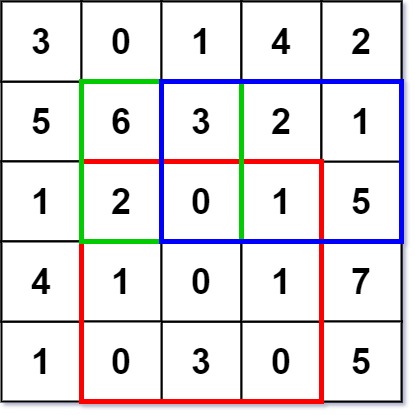问题描述
给定一个二维整形数组,要求多次查询某个子矩阵的和。题目链接:**点我**
样例输入输出
输入:
[“NumMatrix”, “sumRegion”, “sumRegion”, “sumRegion”]
[[[[3, 0, 1, 4, 2], [5, 6, 3, 2, 1], [1, 2, 0, 1, 5], [4, 1, 0, 1, 7], [1, 0, 3, 0, 5]]], [2, 1, 4, 3], [1, 1, 2, 2], [1, 2, 2, 4]]输出:
[null, 8, 11, 12]
解释:
NumMatrix numMatrix = new NumMatrix([[3, 0, 1, 4, 2], [5, 6, 3, 2, 1], [1, 2, 0, 1, 5], [4, 1, 0, 1, 7], [1, 0, 3, 0, 5]]);
numMatrix.sumRegion(2, 1, 4, 3); // return 8 (i.e sum of the red rectangle)
numMatrix.sumRegion(1, 1, 2, 2); // return 11 (i.e sum of the green rectangle)
numMatrix.sumRegion(1, 2, 2, 4); // return 12 (i.e sum of the blue rectangle)
问题解法
此题最直接的做法就是每次查询都遍历子矩阵的值进行累加,不过这对单次查询是有效的,但是对于多次查询这效率就有点低,所以高效一点的做法是使用前缀和的思路,先对矩阵进行求和。用 dp[i][j] 表示从矩阵的左顶点到 (i, j) 节点的子矩阵的元素和。则 dp[i][j] = dp[i - 1][j] + dp[i][j - 1] - dp[i - 1][j -1] + matrix[i][j]。对于求解 (row1, col1) 到 (row2, col2) 的子矩阵的元素之和,其结果可以用 dp[row2][col2] - dp[row2][col1 - 1] - dp[row1 - 1][col2] + dp[row1 - 1][col1 - 1] 来表示。这样,多次查询的时间复杂度就控制在 O(1) 内,只需要在开始的地方用 O(n * n) 的时间复杂度构造 dp 数组即可。代码如下
1 | class NumMatrix { |
